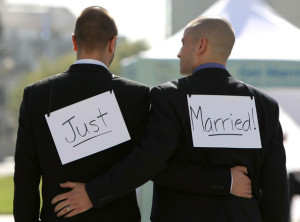 I think most Utahns, for or against, anticipated this would happen at some point. While Judge Shelby’s decision does not at first blush smell of blatant activism, decisions made by “the people” being rendered moot by a imperious federal government is a sore point for many across the nation, especially in a conservative stronghold like Utah.
I think most Utahns, for or against, anticipated this would happen at some point. While Judge Shelby’s decision does not at first blush smell of blatant activism, decisions made by “the people” being rendered moot by a imperious federal government is a sore point for many across the nation, especially in a conservative stronghold like Utah.
Expect an appeal, especially since the LDS Church, which staunchly opposes same-sex marriage and shows no signs of relenting on the matter, counts among its members many high-ranking civil servants throughout the state. I would also expect the appeal to fail, or if it succeeds, to be reversed eventually. If a state like Utah can be forced to abide policy with which a majority of its citizens do not agree, it causes me to wonder how far a leap it is to the next steps, such as forcing religions to perform same-sex marriage ceremonies (despite same-sex marriage proponents’ protestations that that will never happen). I believe a truly unbiased observer would see it as likewise inevitable.
Do you also believe it inevitable that churches will be forced to perform interracial marriages?
I don’t think the comparison between interracial marriage and same-sex marriage is very sound. Philosopher Francis Beckwith has written a helpful post on the history of common law and interracial marriage: http://www.thepublicdiscourse.com/2010/05/1324/
Happily, supporters of same-sex marriage will regard Beckwith’s analysis as seriously flawed. Everything opposite-sex couples can do without state intervention, same-sex couples can do as well. This includes raise the biological children of one partner without the state ending one’s parents rights (in the case of a parent who has died or abandoned the child) and even raise the biological children of both parents, in the rare case of a post-conception transgender switch or a plausible future case of medical intervention. It probably doesn’t much matter whether these objections to Beckwith’s position are terrible–so long as those who’d otherwise want to push for increased same-sex marriage rights believe that there is a strong analogy between same-sex and interracial marriage, they’re unlikely to raise Beckwith’s argument in court.
“This includes raise the biological children of one partner without the state ending one’s parents rights (in the case of a parent who has died or abandoned the child) and even raise the biological children of both parents, in the rare case of a post-conception transgender switch or a plausible future case of medical intervention.”
That’s not Beckwith’s point. He doesn’t argue that same-sex couples are incapable of *raising* a child. He states, based on the historical documentation, that common-law marriage presupposed the *natural outcome* (via procreation) of marriage, which was a child. This is why Beckwith writes, “For if the purpose of anti-miscegenation laws was racial purity, such a purpose only makes sense if people of different races have the ability by nature to marry each other. And given the fact that such marriages were a common law liberty, the anti-miscegenation laws presuppose this truth.” You have to invoke “the rare case of a post-conception transgender switch or a plausible future case of medical intervention” in an attempt to say that “everything opposite-sex couples can do without state intervention, same-sex couples can do as well.” Beckwith’s point is that a marital union is the natural outcome of biological and sociological forces and common law reflected this.
“It probably doesn’t much matter whether these objections to Beckwith’s position are terrible.”
You’re right. It doesn’t because the interracial argument is a powerful rhetorical tool, even though it doesn’t really work. Personally, I think there are better arguments for same-sex marriage than the interracial analogy (which Beckwith also admits).